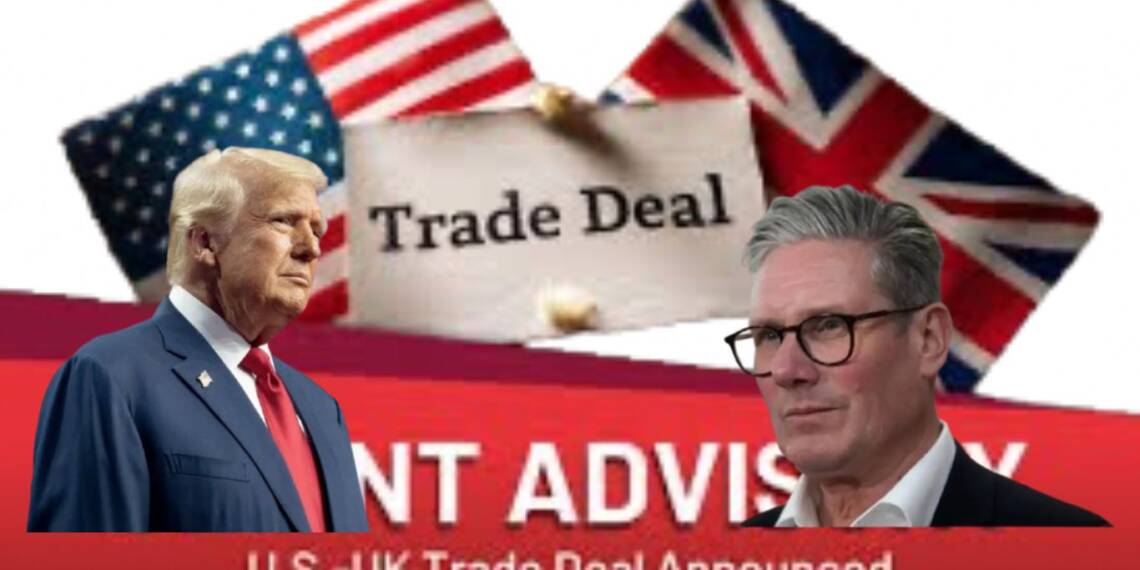In a landmark development, the United Kingdom has become the first nation to sign a sector-specific trade deal with the United States following the imposition of new reciprocal tariffs by US President Donald Trump on April 2.
The Day of the Agreement
The agreement, announced on May 8, coincided with the 80th anniversary of VE Day, a moment of historical significance when Allied forces marked the defeat of Nazi Germany in World War II. The occasion served as a symbolic backdrop to renewed economic cooperation between the two long-standing allies.
Described by President Trump as “our first Fair, Open, and Reciprocal Trade Deal,” and hailed by British Prime Minister Sir Keir Starmer as a “historic deal” that safeguards jobs and strengthens British industry, the agreement provides critical relief to UK sectors disproportionately affected by recent US tariff escalations.
Tariff Relief for Automakers: A Lifeline for Britain’s Luxury Car Industry
The most immediate and impactful component of the deal is the reduction in tariffs on automobiles. US import duties, which had surged to 27.5% last month under Trump’s global tariff regime, will now be lowered to 10% for the first 100,000 vehicles exported from the UK each year. This figure roughly corresponds to the UK’s car export volume to the US in the previous year, effectively preventing further disruption without expanding the current trade ceiling. This measure is particularly vital for British luxury automakers such as Jaguar Land Rover and Rolls-Royce, which rely heavily on the US market.
According to Business Secretary Jonathan Reynolds, the automotive sector was on the brink of severe contraction due to the heightened tariffs, with job losses anticipated across major UK car manufacturers. Reynolds stated, “This was very serious. It would have meant people would have lost their jobs without this breakthrough.”
Steel, Beef, and Boundaries: Targeted Gains Without Regulatory Compromise
Steel and aluminium, another set of sectors severely impacted by the 25% tariff rise earlier this year, will also benefit. Rather than completely eliminating duties, the United States will now implement a quota system for UK steel and aluminium at Most Favoured Nation (MFN) rates. This reinstates a previous arrangement, significantly reducing the financial burden on UK producers and averting a potential crisis in the domestic steel industry, which had recently faced existential threats.
Agriculture also features prominently in the agreement. The US and UK have agreed to a mutual annual quota of 13,000 metric tonnes of tariff-free beef exports. Previously, UK imports of US beef were capped at 1,000 metric tonnes and faced a 20% tariff. The new arrangement significantly increases US access to the UK beef market, while providing equivalent access for UK farmers. The US Trade Representative’s office estimates the agricultural component of the deal, including beef, ethanol, and other products, will open up to $5 billion in potential export opportunities, with ethanol alone accounting for $700 million.
However, the agreement remains strictly within the bounds of existing UK regulatory standards. Concerns over food safety had previously stalled trade talks, particularly regarding US practices such as hormone-treated beef and chlorinated chicken. The UK government confirmed that there will be no compromise on food quality standards, a position that domestic farming and consumer advocacy groups have welcomed.
Not Quite a Free Trade Deal
Despite the positive reception, it is important to clarify that the agreement does not constitute a conventional free trade deal. It is narrowly focused, sector-specific, and aimed at mitigating the immediate economic fallout of the recent US tariff impositions. A 10% tariff remains applicable to all other UK exports to the US not covered under this arrangement. Future negotiations are expected to address this remaining broad tariff framework.
In public addresses following the deal, Prime Minister Starmer stated, “Jobs saved, jobs won but not job done,” acknowledging the progress made while signalling that further negotiations are required to secure comprehensive market access. President Trump, while calling the agreement “comprehensive,” also expressed a desire to expand its scope in the coming months.
Market reaction to the announcement was notably positive. US financial indices closed higher on Thursday, with the Dow Jones Industrial Average rising by 254 points, or 0.62%. The S&P 500 increased by 0.58%, and the Nasdaq Composite gained 1.07%. The uptrend followed President Trump’s comments suggesting optimism for further trade negotiations, including those with China.
This agreement, while not a free trade treaty in the traditional sense, represents a critical step towards restoring transatlantic trade stability and protecting key British industries from sudden tariff shocks. It serves as a strategic response to an increasingly protectionist US trade policy landscape and underscores the urgency of sustained diplomatic engagement to secure broader and legally binding trade terms in the future.








